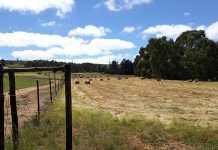‘If the farmer cannot survive, the agribusinesses that now make large profits from agriculture will also not survive.’
ACCORDING TO NATIONAL DEPARTMENT of Agriculture figures, farmers had a gross income of R72,92 billion for the year from October 2005 to September 2006. Total farm costs amounted to R61,54 billion. This includes intermediate expenditure of R43,58 billion. Out of their gross income, farmers received a net income of R13,63 billion or about 19 cents per rand, while the rest of the value chain received 81 cents. The bulk of this 81 cents was spent at the different agribusinesses.
The price of farm inputs increases at a faster rate than the price of farm produce . The farmer’s profitability decreases, while agribusinesses provide very attractive profits to their shareholders. In addition to the deteriorating terms of trade (ratio between input and output prices) of agriculture, farmers face various other threats and must comply with a multitude of new laws and regulations to remain legal. They must achieve a high enough score on the AgriBEE scorecard – if they do not, they may find that processors no longer want to buy their products. While farmers find it increasingly difficult to make ends meet, the opposite is true for agribusinesses. A quick internet search showed that agribusinesses declared substantial profits for the 2005/06 financial year.
Among the former farmer cooperatives, Afgri made a profit of R172 million (up 4,9% on 2005), Senwes a profit of R141 million for the six months to 31 October 2006, and Kaap Agri increased its earnings from operations by 50% and improved cash flow by R161,3 million for the year to 30 September 2006. Total headline earnings increased by 8% to R154 million. Feed manufacturers also did well. Meadow contributed R272 million to Astral’s R766 million profit. Meadow’s profit increased by 27% from 2005 to the 2006 financial year, while profit margins increased from 8,5% to 10,2%. These few examples show how profitable it is to trade with farmers. This does not imply that these companies make unfair profits or that those agribusinesses not mentioned make smaller profits.
Many agribusinesses and other companies depend on farmers for their income. Silence is golden for agribusinesses When the minister of agriculture recently accused farmers of various atrocities, the only voices that came out on behalf of the farmers were those of Agri SA and TAU SA. The Agricultural Business Chamber, which represents the major agribusinesses, remained silent. Agribusiness leaders also remained quiet.
Business leaders have in the past also remained silent on various issues that affect farmers. When minister Thoko Didiza published her first AgriBEE document, a prominent agribusiness leader was quoted in the press as saying that they in the financial sector must comply with their own charter, and that farmers will have to do the same. A study by the Bureau for Food and Agricultural Policy at the University of Pretoria pointed out in a 2005 report that most farmers couldn’t afford to implement AgriBEE strategies. Apparently the recently published general broad-based BEE guidelines exempt companies with a turnover of less than R5 million from the BEE requirements.
However, processors and retailers who need to source goods from BEE suppliers will force farmers to comply, even though they are not legally bound to do so. Modern businesses are quick to point out in their annual statements that they act with corporate responsibility and that they look after the so-called triple bottom line, namely profit, the environment and social responsibility. Companies who keep quiet about issues that threaten society or a sector of society do not fulfil their social obligations. The survival of the commercial farmer in South Africa is under threat from various sides.
According to agricultural leaders who are closely involved with the issue, the recent attacks on farmers about alleged unfair labour practices are part of a campaign to discredit the commercial farmer and to create a climate in which even Zimbabwe-style land grabs may become acceptable to the population. Farmers cannot fight this total onslaught on their own. If farmers cannot survive, the agribusinesses that now make large profits from agriculture will also not survive. Farmers need the support of agribusiness. There are some agribusinesses that are prepared to “put their mouths where their money is” and support farmers. Farmers should identify these few real friends of agriculture and vote for them with their money. Dr Koos Coetzee is an agricultural economist at the MPO. All opinions expressed in this column are his own. |fw




